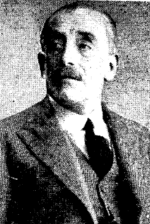Peter Grain (judge) facts for kids
Quick facts for kids
Sir
Peter Grain
|
|
|---|---|
 |
|
| Judge, British Supreme Court for Egypt | |
| In office 1919–1921 |
|
| Assistant Judge, British Supreme Court for China | |
| In office 1921–1927 |
|
| Preceded by | Skinner Turner |
| Succeeded by | Gilbert Walter King |
| Judge, British High Court of Weihaiwei | |
| In office 1925–1930 |
|
| Preceded by | Hiram Parkes Wilkinson |
| Succeeded by | Court abolished |
| Chief Judge, British Supreme Court for China | |
| In office 1927–1933 |
|
| Preceded by | Skinner Turner |
| Succeeded by | Allan Mossop |
| Personal details | |
| Born | 25 September 1864 |
| Died | 6 May 1947 (aged 82) Farnham Common, England |
Sir Peter Grain (1864 – 1947) was an important British judge. He worked in many different countries. These included Zanzibar, Egypt, Constantinople (now Istanbul), and China. He was the main judge for the British Supreme Court for China. He held this role from 1927 to 1933. He also served as a judge for the High Court of Weihaiwei from 1926 to 1930.
Contents
Early Life and Education
Peter Grain was born on September 25, 1864. His father, John Peter Grain, was a well-known lawyer in London. He specialized in criminal cases. Peter Grain followed in his father's footsteps. He became a lawyer himself in January 1897. He joined a special legal group called the Middle Temple.
A Career in Law
Peter Grain worked as a lawyer in London for 10 years. He often worked with his father on criminal cases. From 1902 to 1906, he was part of the Bar Council. This group helps guide lawyers.
Working for the British Government
In 1906, when he was in his early 40s, Peter Grain started a new job. He joined the Foreign Office Judicial Service. This meant he would work as a judge for the British government in other countries. His first assignment was in Zanzibar.
- In 1906, he became a local judge in Zanzibar.
- Later that year, he was promoted to Assistant Judge. He also became a judge for the Court of Appeal for East Africa.
- For a short time, he worked as the main lawyer for the Zanzibar government. He was also the Acting First Minister there.
- He received a special award from Zanzibar, called the Order of the Alijah, 1st class.
Moving to Other Countries
In 1910, Peter Grain became an Assistant Judge in Constantinople. This was for the British Consular Court there. He was the Acting Judge in 1911.
During World War I, he had a special role in Egypt. He was a judge for cases involving German and Austrian people. He also worked in a special court called the Prize Court. This court dealt with ships captured during the war. In 1915, he became an Assistant Judge for the British Supreme Court for Egypt. He became a full Judge there in 1919.
Serving in China
In 1921, Peter Grain moved to Shanghai, China. He became an Assistant Judge for the British Supreme Court for China. In 1926, he also started working as a judge for the High Court of Weihaiwei. Weihaiwei was a British territory in China at the time.
In 1927, he was promoted to the highest judicial position in China. He became the Chief Judge of the British Supreme Court for China. He was given the title "Sir" in 1928, which means he was knighted. He continued to serve as a judge in Weihaiwei until 1930. That year, Weihaiwei was returned to Chinese rule.
Retirement and Later Life
Sir Peter Grain retired from his work as a judge in 1933. He then moved back to England. He passed away on May 6, 1947. He was 82 years old and living in Farnham Common, Buckinghamshire.
 | Mary Eliza Mahoney |
 | Susie King Taylor |
 | Ida Gray |
 | Eliza Ann Grier |

